At the risk of overloading BikePortland with one subject (we’ll also be covering the outcome of this afternoon’s hearing about parking vs. housing in northwest Portland), one pretty simple fact seems to be getting lost in the city’s big transportation debate of the moment.
More or bigger parking garages will do nothing to reduce curbside parking unless people have some new reason to use them.
Right now, in Portland’s Northwest District, a parking space in a garage or lot costs about $1,800 per year. A city permit to hunt for space on the public curb costs $60 per year.
So what on earth is going to motivate anyone to park their car in the bigger garages that the city’s law would mandate? There’s only one answer: It would have to remain extremely annoying to find street parking in the Northwest District.
So if the only way this policy works is if the curbs of the Northwest District remain crowded, what is the point of mandatory garages in the first place?
The city is sitting on a proposal that would actually work
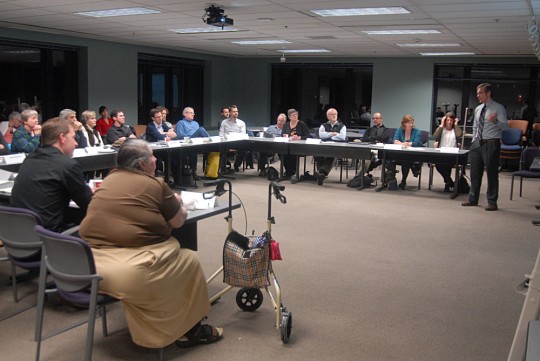
(Photos: M.Andersen and J.Maus/BikePortland)
Fortunately for people who need or want to use cars in the Northwest District, there is a possible city policy that could help solve this problem.
It’d be to change the city’s parking permit rules, either by making permits more expensive, by issuing fewer of them, or both.
Even more fortunately, a huge committee of relevant stakeholders spent most of last year developing such a policy. We’ve covered it extensively. The city council has discussed it favorably, with Transportation Commissioner Steve Novick leading the charge and seemingly winning most of his colleagues over without any votes being taken.
Under the recommendation passed by consensus of the volunteer committee, the city would give neighborhoods the right to create a new overnight parking permit system in their areas, approved by popular vote. They could work with city staff to set the price and number of permits available. The permits would apply only in residential zones and people who live in residential zones would have first crack at the permits, but neighborhoods could opt to sell them to people who live elsewhere.
Advertisement
It’s not a perfect proposal — a simple change to make the permits transferable would let individuals set a fair price for street parking spaces rather than forcing neighborhoods to guess the right one in advance — but it would work.
Neighborhoods would basically get to self-regulate developers in their areas. If a development wasn’t building enough parking for its residents, developers would need to either attract car-free people, build sufficiently large garages, or buy street permits at a price set by the neighborhood.
That’s called a win-win.
What happened to letting neighborhoods self-regulate their parking?
The odd thing is that sometime in the last few months, the proposal has seemed to vanish. Friday afternoon, in an email exchange about the Northwest District policy, I asked Novick what had caused the delay and when permit reform was likely to return to council. He hasn’t replied since. I honestly have no idea what’s going on here.
Nobody likes the price to go up for something they use. So no matter what, some Portlanders will reach for every available scapegoat — developers, politicians, maybe even bicyclists somehow — to explain to themselves why more new or more expensive parking permits are unnecessary.
But the fact is that anyone who thinks about this issue for more than a minute at a time will realize that more garages are pointless without changing the permit rules, and that if you had different permit rules then developers would be building adequate garages without a mandate.
Mandating parking garages instead of reforming parking permits, as the city council is debating this afternoon, only reinforces the idea that developers or politicians or anyone else has the power to get someone to move into a garage when the public is already offering a cheaper option on the curb.
— Michael Andersen, (503) 333-7824 – michael@bikeportland.org
Our work is supported by subscribers. Please become one today.



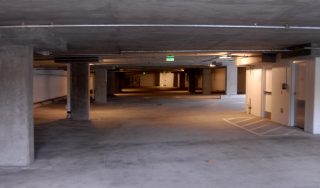
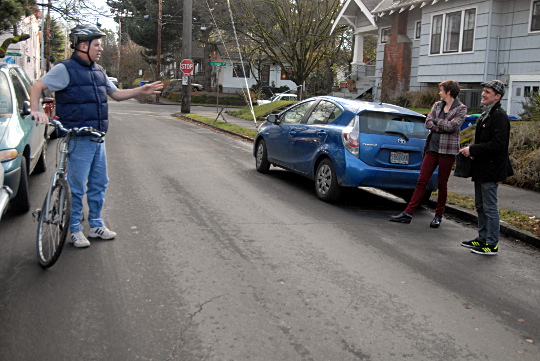
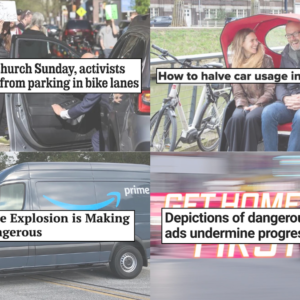


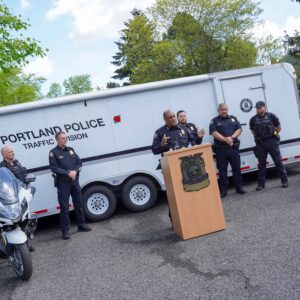
Thanks for reading.
BikePortland has served this community with independent community journalism since 2005. We rely on subscriptions from readers like you to survive. Your financial support is vital in keeping this valuable resource alive and well.
Please subscribe today to strengthen and expand our work.
One day when all the cars are gone, people will look with amazement and disgust at the acres of asphalt and ugly concrete structures that we covered the earth with. They will not look kindly on the enormous amounts of money, resources and ruined bits of the earth that went in to this folly. The only thing that they will be able to conclude is that for 150 years or so we went insane.
I think there is a decent possibility that the people will be gone too.
That would probably slow the growth in rents.
100% correct.
If the goal is to have people without cars move into these garage-free developments, the city has to remove the incentive to park cars for (next to) nothing instead. That way, people who think they need to have a car will specifically look for one of the many buildings that already has off-street parking.
these dense popular parts of town get all the good coverage… meanwhile there are still thousands of illegally parked cars in the rest of the city right now as I type…
even in dense NW districts reports of cars parked illegally for months go ignored…
I’m starting to give up on activism because the ways the city has you report and their lack of action (or in some cases flat out refusal) tells me that the city doesn’t care…
this used to be a city of activism, now it’s a city of vigilante justice…
With all the homeless, addicted, crime, etc. etc. it seems like the fabric of civilization has broken down. Maybe the authorities are just overwhelmed and have a dozen better things to do beside enforcing arcane parking regulations.
I got side swiped sitting waiting to making a left turn in East Portland. Knocked the plastic part off my bumper and knocked the door spring out so my trucks door crushes me when I open it on a hill (my driveway). I digress.
I didn’t bother calling the cops. She was still driving and hell I figured unless the other driver and I were shooting at each other, I would never get a response.
I drove home as was.
Cops do the best they can with their resources, they just have other priorities. Like triage in a mass casuality.
Couple tips. City policy is to apply a tow warning on automobiles reported abandoned and to give the owner ample opportunity to move their property. In my experience, unless there is a safety issue, parking patrol does not check up on cars after the green warning sticker is applied. You will probably need to report it again if the vehicle is truly abandoned. PDX Reporter app makes it easy. Cars with valid plates not displayed, or visibly undrivable condition (flat tire) are the priority.
More than clearly abandoned vehicles, I wonder how many marginally useful autos would disappear from the streets if parking cost anything at all.
Yes, I have two cars, one of which needs $600 in repairs. It’s been parked in NW for months. I move it a block if it gets warning stickers and wash the windows. It’s fully paid for therefore cheaper than my other, gas efficient car for which I make payments. I keep both, as my big clunker is my back-up if the little one gets repossessed by the bank. Sorry for taking 2 spots, but not giving either up. And yes, I bike to work.
Thanks for sharing your selfishness.
Good question. What did happen to the parking permit proposal? I’m guessing City Council didn’t want to ruffle any feathers during an election. How about passing that proposal this afternoon instead of this shortsighted parking minimum increase?
Thank you for this. Anyone trying to find parking in NW at 6pm immediately realizes that parking is not expensive enough down there. We need the street parking to be priced so people can actually visit these neighborhoods and park in them. Many avoid it right now because there is no available parking for customers and visitors.
>> But the fact is that anyone who thinks about this issue for more than a minute at a time will realize that more garages are pointless without changing the permit rules, and that if you had different permit rules then developers would be building adequate garages without a mandate. <<
I find this quote interesting because it seems to suggest that it would be desirable for developers to be building parking, but only if they are not mandated to do so by the city.
In the end, the effect will be the same, and we'll have a regressive tax on those who need a car but don't have much money.
For the record, I do support a permit system in areas that need them, like NW Portland, and I support proposals to limit access to permits by residents of newer buildings where developers opt to provide no on-site parking. That seems to me to be the best way to ration access to a scarce commodity, and to provide opportunities for lower rents in exchange for fewer amenities (i.e. parking).
Now I'm off to find a story about bikes. There must be one on this site somewhere!
The difference between mandates and permits is that mandates remove the powerful financial incentive for developers to come up with more ways to create housing that’s better optimized for people who don’t own cars.
For example, people who get around by bike.
Proposals to limit access to parking by residents of buildings that opt out would do this as much or more, because developers would need to make a more explicit decision in this regard, right?
Sure! That just doesn’t happen to be part of the policy proposal that the city spent a year developing.
Has the city abandoned its permit system that restricts access to permits by residents of buildings in commercial zones? That would have a very similar effect.
The difference is that the existing permit system (like the existing meter system) only restricts daytime hours. It’s intended to protect commercial parking on the central east side, etc. Permits near apartment buildings in residential areas would need to be overnight permits. Those don’t exist right now.
Are you sure? I saw a new residential permit parking zone near 13th & Clinton (I think) that didn’t look time limited. I’ll check again. There are so many parking programs/proposals floating around that, I’ll admit, it gets confusing what is what. Besides, daytime restrictions would impact anyone who doesn’t use their car every day, which is essentially everyone who ever takes a vacation day without their car.
The other major difference (and yeah, this may matter more) is that at least in NW, there’s no cap on the number of permits the city sells. It’s just a hunting license. That’s why streets are crowded there despite permits.
The proposed evening permit policy would be limited based on space; the complicated question is how to decide who gets them. (Note that the usual way to ration scarce goods is to let individuals settle on a fair price, but for whatever reason the city has avoided recommending this.)
>Note that the usual way to ration scarce goods is to let individuals settle on a fair price, but for whatever reason the city has avoided recommending this.
Here’s a hint as to the city’s reasoning there:
https://www.portlandoregon.gov/bps/article/445151
“For the City of Portland, any foreseen discrimination is unacceptable, especially if the discrimination perpetuates inequities of the past along racial, income, and ability lines.”
>Even if more garages were a good idea, they’re pointless without permits
Why do the permits have to come first? Say a car free condo building goes in on NW 21st in a mixed use zone. In two years the city puts together a parking system, you’re only eligible if you live in a residential zone. The residents of the no parking condos that just went in on 21st are ineligible. Fifty feet away you have houses that were built without parking, the people who live there are eligible. Neither structure was built after the law restricting access to once open to the public street space was made. On average the residents of the houses are richer than those of the new apartment building. Given the city’s wacky property tax system, it’s possible the cheaper condos would end up with comparable property tax bills to the more expensive houses. Lose the property tax issue and you can change the scenario to a rent only apartment building. Does that multi family building going in without parking today make it harder to reform street parking tomorrow, or create an inherent inequity if it’s eventually done? Are you creating a larger market for street parking, making it harder to get rid of parking spots in the area for bike lanes, sidewalk extensions, plazas, transit lanes, parklets etc….?
Despite claims by some, given land prices in some inner areas I’m not sure a parking mandate drives up rents or kills many construction projects, at least assuming an average construction cost per spot. There will likely be lots where actually constructing parking would be cost prohibitive, but paying a fee equal to the average cost of parking construction would not, to be used to fund capital expansion of non car transportation facilities in the area. Or where one level of underground parking would create 90% of the required spaces, but excavating a second level to get the last 10% would drastically drive up the cost per spot, so paying a fee in lieu of the last 10% of required spots should be an option. Like Portland’s other development fees, waive the parking spot/fee alternative for any subsidized units reserved for low income individuals/families.
The way I see it, the main beneficiaries of no parking requirements in inner NW and similar expensive areas are the existing owners of buildable lots and those who fantasize about banning cars from the area completely for whom a garage seems to create a permanent constituency against their car free future. If there’s research showing that I’m wrong about the impact of parking in this sort of environment (not parking requirements generally), I’d love to see it. Any Portland Shoupistas care to point me towards something to read?
East Beaverton by Western Ave could use an overhaul. Many empty parking lots at retail-zoned properties near 5th Street bikeway.
The elephant(s) in the room in all discussions surrounding lessening car use (the parking discussion being a BIG part of that) is that
A) Many people want to bike but do not because it feels unsafe (I count myself as one of them!)
B) Trimet is not adequate as a replacement for your car, for a variety of reasons, but mostly centering around frequency of service.
C) Driving is getting more painful in Portland, but it’s still the quickest way to get around outside of rush hour.
I am all for minimizing private car use as much as possible, but there are some serious structural challenges to actually getting there. I mean, yeah, NW is transit-rich, by Portland standards, but it’s still pretty bad.
It’s very hard to design efficient mass transit when it has to share lanes with pollution-spewing automobiles…
Yes, it is very hard–and Seattle is doing it. Portland is taking the easy way out, and it shows.
It mostly requires money and a bold vision. We seem to have neither.
I would settle for just bold. You don’t need a lot of vision to realize that 31-in-a-20 speeding and similar status-quo reckless driving are a deterrent to non-car modes of transportation, or to see that heavy obstacles near the path of travel deter speeding and reckless driving. You also don’t need much money to place some heavy objects in the street, even with high-viz paint. More steel bollards would also make on-street parking less appealing to unqualified drivers and/or support local jobs in fender and paint work. Stumptown needs its stumps!
In a perfect world the goal of a new parking fee plan is not to encourage developers to build more parking spaces, as this just uses up more space that could be used to house people, and puts more cars on the streets. We need parking policies ( pricing) that will encourage people to give up their cars and take up other forms of transportation. If we are to tackle climate change and save the planet we must craft every policy with the goal of minimizing the number of cars.
Probably the most effective way to do this is to increase the cost of making trips, not of the fixed cost of car ownership, as it is easier to nibble away at the marginal trips rather than make auto ownership an all-or-nothing proposition.
I would far rather see a carbon/gas tax increase and development of better alternatives than to try to impose a high fixed cost at the point of origin.
[b]Under the recommendation passed by consensus of the volunteer committee, the city would give neighborhoods the right to create a new overnight parking permit system in their areas, approved by popular vote. They could set the price and the number of permits available.[/b]
This is about the dumbest idea ever. It may be that it was proposed in an earnest attempt to offer a solution, but it has all the fairness of a gated community.
You mean a gated community that includes everyone except those living in a special situation. In many cases, rents are higher in the commercially zoned apartment buildings than they are in the residential zoned areas.
Gated to cars, yes. Open to people.
Thank you so much for your tireless reporting on this issue. I work for a very large employer in NW and it boggles the mind how much time, energy, and financial resources are devoted to storing cars. It boggles the mind.
This is what I don’t understand: developers insist adding parking to buildings pushes up rent, because of the costs to build it.
But then they charge almost two grand per year for residents to use each space.
Surely that offsets the cost of building each space??
Why does onsite parking have to drive up everyone’s rent in the building by 400 bucks a month, if they are charging two grand a year for parking stalls?
I’m confused.
I guess what I am trying to say is, it sounds an awful lot like developers are trying to have their cake and eat it…
It doesn’t drive up rent. Landlords will charge as much as they can, regardless of the cost of development. It’s a bogus claim.
It seems pretty obvious that the parking minimum was the alternative to permits. It was the attempt to keep “them” from parking in “our” spots.
Back to the drawing board I suppose. The danger of hooking every wagon in town to affordability is that you’re left with the tail wagging the dog. If you oppose a policy, just claim it hurts the poor.
I think the partnership between affordability proponents and developers is an unholy alliance that is going to generate a considerable backlash in the near future.
You can’t have affordable housing without some sort of partnership with developers. Or do you want the government to be in the business of building housing?
It’s amazing when this comes up, how the transit that covers a fair bit of this area of the city is just entirely ignored. It’s almost like people all of a sudden just don’t use transit in the northwestern pocket. Maybe if people gave two seconds to actually planning their trips to the area we could offload a major…
…naw, this is America, price the ever living bajeezus out of that parking. To many people are encouraged to often, even in ole’ smart Portland, to just make bad decisions about transportation usage. We need some reasonable incentives, and forcing parking onto the shoulders of developers, renters, and home/condo/building owners is just absurd when we’re encouraging them to not need parking in the first place. Visitors can and should pay and will pay to visit the area by car. They should for all the cost they put on everyone else in the area and the damage they do to the city, people, air quality, and the like.
Why do we keep defending this insidious mode of transport when there is simple reasoning and some simple marketing to put out the word that they pay a little to encourage some better decision making. People will support it, and it won’t even be a complaint after a month or two of implementation.